Related Research Articles

Aphra Behn was an English playwright, poet, prose writer and translator from the Restoration era. As one of the first English women to earn her living by her writing, she broke cultural barriers and served as a literary role model for later generations of women authors. Rising from obscurity, she came to the notice of Charles II, who employed her as a spy in Antwerp. Upon her return to London and a probable brief stay in debtors' prison, she began writing for the stage. She belonged to a coterie of poets and famous libertines such as John Wilmot, Lord Rochester. Behn wrote under the pastoral pseudonym Astrea. During the turbulent political times of the Exclusion Crisis, she wrote an epilogue and prologue that brought her legal trouble; she thereafter devoted most of her writing to prose genres and translations. A staunch supporter of the Stuart line, Behn declined an invitation from Bishop Burnet to write a welcoming poem to the new king William III. She died shortly after.
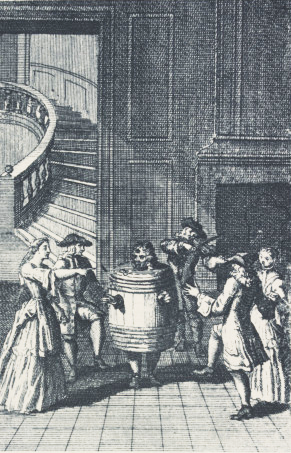
"Restoration comedy" is English comedy written and performed in the Restoration period of 1660–1710. Comedy of manners is used as a synonym for this. After public stage performances were banned for 18 years by the Puritan regime, reopening of the theatres in 1660 marked a renaissance of English drama. Sexually explicit language was encouraged by King Charles II (1660–1685) personally and by the rakish style of his court. Historian George Norman Clark argues:
The best-known fact about the Restoration drama is that it is immoral. The dramatists did not criticize the accepted morality about gambling, drink, love, and pleasure generally, or try, like the dramatists of our own time, to work out their own view of character and conduct. What they did was, according to their respective inclinations, to mock at all restraints. Some were gross, others delicately improper.... The dramatists did not merely say anything they liked: they also intended to glory in it and to shock those who did not like it.

Fop became a pejorative term for a man excessively concerned with his appearance and clothes in 17th-century England. Some of the many similar alternative terms are: coxcomb, fribble, popinjay, dandy, fashion-monger, and ninny. Macaroni was another term of the 18th century more specifically concerned with fashion.
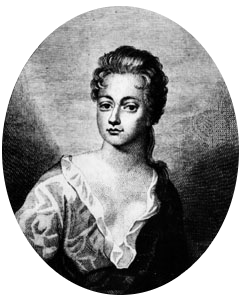
Anne Bracegirdle was an English actress.

The Way of the World is a play written by the English playwright William Congreve. It premiered in early March 1700 in the theatre in Lincoln's Inn Fields in London. It is widely regarded as one of the best Restoration comedies and is still occasionally performed. Initially, however, the play struck many audience members as continuing the "immorality" of the previous decades, and was not well received.
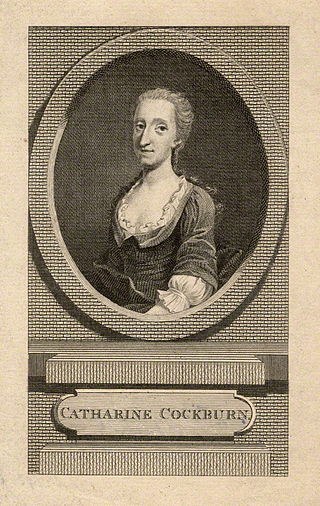
Catharine Trotter Cockburn was an English novelist, dramatist and philosopher who wrote on various subjects, including moral philosophy and theology, and maintained a prolific correspondence.
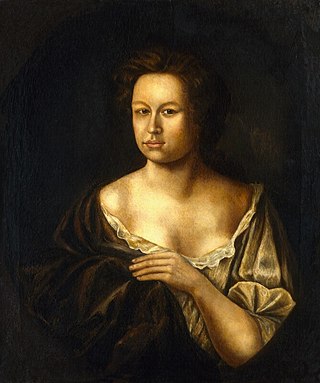
Mary Pix was an English novelist and playwright. As an admirer of Aphra Behn and colleague of Susanna Centlivre, Pix has been called "a link between women writers of the Restoration and Augustan periods".
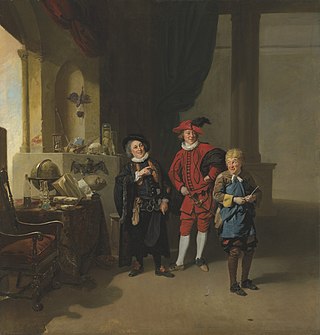
The Alchemist is a comedy by English playwright Ben Jonson. First performed in 1610 by the King's Men, it is generally considered Jonson's best and most characteristic comedy; Samuel Taylor Coleridge believed that it had one of the three most perfect plots in literature. The play's clever fulfilment of the classical unities and vivid depiction of human folly have made it one of the few Renaissance plays with a continuing life on stage, apart from a period of neglect during the Victorian era.
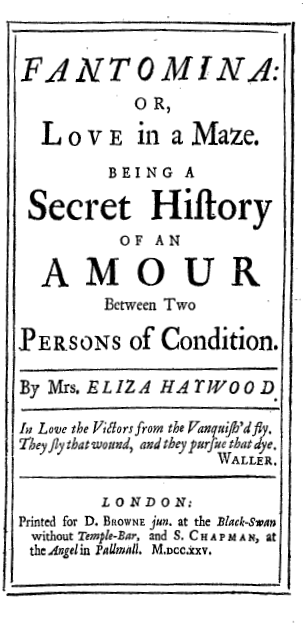
Fantomina; or, Love in a Maze is a novel by Eliza Haywood published in 1725. In it, the protagonist disguises herself as four different women in her efforts to understand how a man may interact with each individual persona. Part of the tradition of amatory fiction is to rewrite the story of the persecuted maiden into a story of feminine power and sexual desire.
The Shakespeare Ladies Club refers to a group of upper class and aristocratic women who petitioned the London theatres to produce William Shakespeare's plays during the 1730s. In the 1700s they were referred to as "the Ladies of the Shakespear’s Club," or even more simply as "Ladies of Quality," or "the Ladies." Known members of the Shakespeare Ladies Club include Susanna Ashley-Cooper, Elizabeth Boyd, and Mary Cowper. The Shakespeare Ladies Club was responsible for getting the highest percentage of Shakespeare plays produced in London during a single season in the eighteenth century; as a result they were celebrated by their contemporaries as being responsible for making Shakespeare popular again.
The False Friend; or, the Fate of Disobedience is a she-tragedy written by Mary Pix, and first performed at Lincoln's Inn Fields in 1699. The play is a reworking of William Shakespeare's Othello. The original cast featured John Bowman as Viceroy of Sardinia, John Verbruggen as Emilius, John Thurmond as Lorenzo, John Hodgson as Bucarius, Joseph Harris as Roderigo, Elizabeth Barry as Adellaida, Elizabeth Bowman as Appamia, Anne Bracegirdle as Lovisa, and Abigail Lawson as Zelide.
John Bowman (1651–1739) was a British stage actor. He began his career in the Duke's Company at the Dorset Garden Theatre. In 1692, he married Elizabeth Watson, who acted under the name Elizabeth Bowman. He later switched to act at the Drury Lane Theatre. He is also referred to as John Boman.
William Bowen (1666–1718) was a British stage actor. He was part of the United Company from 1689. For a time, he became known for his comic roles. He was fatally wounded in a duel with fellow actor James Quin in 1718.
John Corey was an English stage actor and playwright of the eighteenth century. His name is sometime written as John Cory.
Elizabeth Willis (c.1669-1739) was a British stage actress.
Elinor Leigh was a British stage actor of the seventeenth century.
The Innocent Mistress is a comedy written by Mary Pix, first performed in 1697.
The Deceiver Deceived is a comedy written by Mary Pix, first performed in 1697.
George Pack was a British stage actor, singer and theatre manager of the eighteenth century. His first known performance on the London stage was as Westmoreland in Shakespeare's Henry IV at the Lincoln's Inn Fields Theatre and he remained with the company until it transferred to the Queens's Theatre in the Haymarket in 1705. He played in a mixture of comedies and tragedies, originating roles in plays by many of the leading dramatists of the era including Nicholas Rowe, Mary Pix, John Vanbrugh and Susanna Centlivre.
Elizabeth Bowman was an English stage actor of the seventeenth and early eighteenth century. The daughter of Sir Francis Watson, 1st Baronet she was adopted by the actor manager Thomas Betterton. In 1692, she married John Bowman and began acting at Drury Lane the following year as Mrs Bowman. She was a member of the United Company until 1695 then joined Betterton's breakaway at the Lincoln's Inn Fields Theatre.
References
- ↑ Juliet McLaren, “Presumptuous Poetess, Pen-Feathered Muse: The Comedies of Mary Pix,” in Gender at Work: Four Women Writers of the Eighteenth Century, ed. Ann Messenger (Detroit: Wayne State Univ. Press, 1990), p. 97.
- 1 2 Heard, Elisabeth J. (2015). Experimentation on the English Stage, 1695-1708. The Career of George Farquhar. Taylor & Francis. p. 41.
- ↑ The Harbrace anthology of drama (4 ed.). Toronto: Thomson Nelson. 2006. pp. 72–73.
- ↑ Pearson, Jacqueline (1988). The prostituted muse (1 ed.). New York: Palgrave Macmillan. p. 172.
- ↑ "Restoration and Eighteenth-Century Theatre Research Index" (PDF).
- ↑ Gollapudi, Aparna; Colorado State University - Fort Collins (November 2018). "Review of Royal Shakespeare Company Production of Mary Pix's The Beau Defeated, retitled The Fantastic Follies of Mrs. Rich". ABO: Interactive Journal for Women in the Arts, 1640-1830. 8 (2). doi:10.5038/2157-7129.8.2.1197. ISSN 2157-7129.